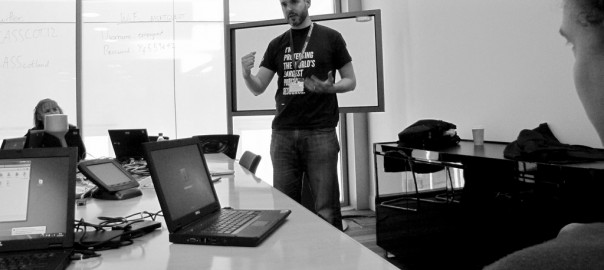Why we need more e-learning staff tutors
In February 2008, whilst walking back from the staff room to my classroom I knocked on the door of my Headteacher’s office. At the time I was teaching History with a bit of ICT at Ridgewood School in Doncaster and had noticed that the school wasn’t using the technology it already had very effectively. The ‘five minutes’ I asked of Chris Hoyle (one of the best leaders I’ve worked for) turned into a fairly epic conversation. In fact, when the bell went and I rose to go and teach Year 9 for the last lesson of the day, Chris buzzed through to his secretary to get someone to cover my lesson.
Chris and I agreed that the problem was that teachers, busy at the best of times, needed showing what could be done with technology. He asked me to write a job description that I thought would help improve the situation. I did so (with the help of others) and, once he’d toned it down from a senior leadership position(!) we agreed upon my becoming e-Learning Staff Tutor starting from the academic year 2008-9.
I’ve still got the overview of what I got up to during my first term in the role, where I spent 50% of my time teaching History and ICT, and the other 50% of my time teaching the teachers. I had a small budget (a couple of thousand, from memory):
Activities
- Lunchtime staff sessions (two per week) on web applications and free resources that enhance teaching and learning.
- Advice to staff via email
- Face-to-face advice and guidance of an informal nature
- Preparation of resources for staff training sessions (online and print)
- One-to-one booked sessions on self-identified areas of development defined by members of staff
- Involvement in ICT Management Group
- VLE training for Years 7 and 8 during Form Period
- Involvement in Becta award-winning Humanities project convened by Balby CLC
- Involvement in Open Source Schools, a Becta-funded project (speaking at BETT 2009 as a result of this)
- Research into new technologies and pedagogies resulting from these technologies
- Implementing and feeding back on new technologies (e.g. purchase and use of six netbook computers).
Successes
- X members of staff have attended at least one lunchtime e-learning session*
- A total of X members of staff have booked X one-to-one sessions
- Email is now being used by the majority of staff within school
- Every department in the school has had some contact with e-learning sessions, with the exception of Drama and Music
- There are in excess of ten subject-related blogs around the school
- The RE department are now using their new interactive whiteboards to enhance teaching and learning after requesting some training
- Smaller issues relating to the school network not picked up on the ‘big sweep’ have been identified and are in the process of being rectified (e.g. location of network points, ability to print to network printers)
Areas for Development
- Number of staff attending lunchtime sessions tailed off as term wore on – strategies to prevent this?
- Ability to visit other schools and conferences for research and development limited by impact on teaching Year 10 GCSE History students. Currently only practical time available is Thursday afternoon.
- From informal conversations, it is clear that staff would welcome an extended amount of time spent with them as a department. This time needs to either be carved out of a school day, INSET day or arranged in an after-school context.
*obviously there were real numbers here but I can only find the draft of this document!
With an increasing number of schools considering going one-to-one with devices and/or considering a ‘Bring Your Own Device’ (BYOD) approach, the need for positions like the one I had for a year at Ridgewood is increasing. Many people will have seen the way the press picked up on the recent Nesta report Decoding Learning. Unfortunately they got it wrong: it’s not necessarily that schools are buying useless gadgets it’s that not enough time and money is being spent on showing teachers how learning gains can be made by using the technology effectively.
I’d love to see schools not only have a senior leadership position for whole-school technology/ICT strategy but, in addition, someone (or a team of people) with the skills to not only teach young people but teach teachers. Get that mix right and technology really does have the potential to transform learning!
Image based on an original CC BY-NC Computing At School Scotland

